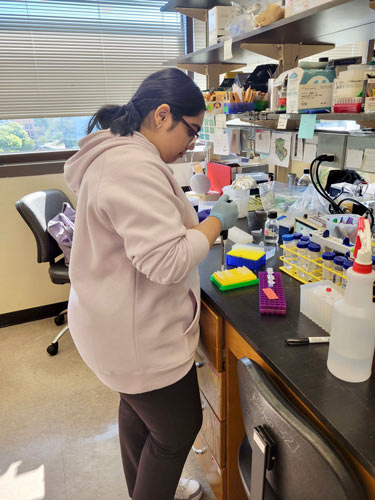Asiya Ahmed is a senior Biological Sciences major, MLL Spanish Minor, and Public Health Minor. She is a STEM BUILD @ UMBC BTP Affiliate & UMBC 2024-25 URA Scholar.
Title of your research project:
“Investigating Genetic Interactions between FLK and HOS1 in Plant Defense and Flowering”
Describe your project:
I’m currently investigating how plants defend themselves from pathogens and abiotic stressors, such as cold temperatures and UV radiation, by examining a possible relationship between two genes named HOS1 and FLK. By analyzing this genetic interaction, my research could contribute to developing crops that are better suited to withstand environmental stresses and disease pressures.

Who is your mentor for your project?
My mentor is Dr. Hua Lu, who is in the Biological Sciences department. I first connected with Dr. Lu after taking her BIOL 302 (Molecular Genetics) course in my sophomore Spring semester. Near the end of the semester, I was interested in joining a research lab and started browsing the Biological Sciences Department website. I landed on Dr. Lu’s profile and looked into her work which caught my attention as she focuses on genetics, a field of science I took much interest in. After contacting her, I met with Dr. Lu and her team, and the atmosphere in her lab was amazing. They were all so welcoming and encouraging, and I knew that a supportive lab like this was the type of lab I would best thrive in.
How did you become interested in this project?
Towards the end of BIOL 302, we started learning techniques geneticists use in the lab such as PCR (Polymerase Chain Reaction), Gel Electrophoresis, and DNA extractions. I was very interested in this unit, so when I joined Dr. Lu’s lab, it was cool to see these exact techniques being done in real life in front of me. Now, I use these techniques myself to genotype my sample plants, allowing me to detect if they have any mutations in their FLK and/or HOS1 genes which can contribute to the possible genetic interaction I’m studying.
What has been the hardest part about your research/what was the most unexpected thing about being a researcher?
I think the hardest part was learning the science behind the work. There were many, many research papers I had to read, but they were not sufficient to understand the foundational concepts. I did my research on the weekends and met with Dr. Lu and PhD student Leah Vrydagh, who I directly work with, to go through the papers. It took me about three months to fully grasp what our lab aims to uncover. To me, the most unexpected thing about being a researcher is how good you get at public speaking. At certain points in the semesters I’ve been working, I have had to present my research and work to the team during our weekly lab meetings. At first, I messed up a lot because of stage fright, but now presenting comes at ease. Truthfully, these lab meeting presentations help tremendously when I present at research conferences or lead general body meetings for the Red Cross Club at UMBC.
What has been the most rewarding part?
The most rewarding part was putting all my 7 months of hard work together into an abstract and poster for my first-ever research conference presentation. This past February, I attended the American Physician Scientist Association (APSA) Mid-Atlantic Regional Meeting at Georgetown University where I presented said abstract and poster. I showcased the science I’ve learned, the techniques I’ve used, and the results I obtained to a diverse audience, ranging from undergraduate students to postdocs and physicians. Also, because I obtained this amazing opportunity through my research, I got to meet and speak with Dr. Anthony Fauci, Former Chief Medical Advisor to the President of the United States, who was our keynote speaker that day. He had shared advice about resilience and purpose which resonated with me and is something I carry as I navigate my studies and research. Without my research and Dr. Lu as my mentor, I never would’ve had this surreal experience.
How will you disseminate your research?
I will be presenting my research at URCAD in Spring 2025, and if there is another conference opportunity next semester, I plan to present there as well.
What is your advice to other students about getting involved in research?
Take rejection as a re-direction, not a failure. When I was trying to join a research lab on campus, I emailed more than a dozen principal investigators before Dr. Lu, and none of them responded (which I understood as they were very busy with their work and the courses they taught). I kept on emailing and emailing for more than a month, but even if I kept on getting no responses, I continued to look for more potential openings and email more PIs. After what felt like years, I finally got a response back from my now mentor. If I had stopped emailing after my first few rejections, I never would’ve done the research I have and made the connections I have today. Just keep on trying even if you fail multiple times because, at the end of the day, your perseverance will be worth it.
What are your career goals?
I am an aspiring physician so medical school is my next step after my studies at UMBC. I understand that it is a challenging path to become a physician, but by persevering and putting in the effort needed, I hope I’ll be able to achieve this goal of mine.
Be a UMBC Researcher of the Week! Email: aprilh@umbc.edu